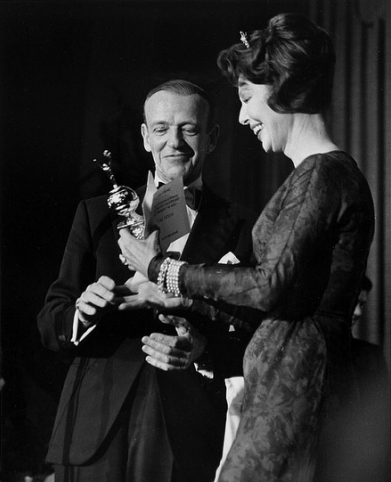
- Cecil B. DeMille
Ready for My deMille: Profiles in Excellence-Fred Astaire, 1961
Beginning in 1952 when the Cecil B. deMille Award was presented to its namesake visionary director, the Hollywood Foreign Press Association has awarded its most prestigious prize 66 times. From Walt Disney to Bette Davis, Elizabeth Taylor to Steven Spielberg and 62 others, the deMille has gone to luminaries – actors, directors, producers – who have left an indelible mark on Hollywood. Sometimes mistaken with a career achievement award, per HFPA statute, the deMille is more precisely bestowed for “outstanding contributions to the world of entertainment”. In this series, HFPA cognoscente and former president Phil Berk profiles deMille laureates through the years. No other star in Hollywood history had the career of Fred Astaire. Ten years of spectacular success at RKO in the ’30s, premature retirement, and then a triumphant return in the late ’40s and ’50s at MGM, where again he reigned supreme.Of course, there has never been a dancer like Fred Astaire. His “Dancing in the Dark” number with Cyd Charisse in The Bandwagon is grace personified. Hands down he was the most inventive and imaginative dancer Hollywood has ever known.Born Frederick Austerlitz, he made his name on the Broadway stage appearing with his sister Adele as a team. When she married an English Lord, he turned solo, and Hollywood beckoned. Screen-tested by Paramount (“Can’t act, slightly bald”) he was signed by David O. Selznick, then in charge of production at RKO. A year later, when teamed up with Ginger Rogers, they became their most valuable property. Their seven films together have never been equaled. At the time Katharine Hepburn correctly explained their chemistry. “Ginger gave him sex appeal, and he gave her class.”But what made them so definitive was RKO’s hiring of Broadway’s greatest songwriters to write original songs for their movies. And what songs they were. “A Fine Romance,” “Pick Yourself Up,” and “The Way You look to Night Up” composed by Jerome Kern and Dorothy Fields for Swing Time. “A Foggy Day in London Town,” “Let’s Call the Whole Thing Off,” “Nice Work if You Can Get It,” the work of George and Ira Gershwin for Damsel in Distress. “They Can’t Take That Away from Me.” again by the Gershwins for Swing Time, “Change Partners,” and “Isn’t This a Lovely Day.” by Irving Berlin for Carefree“Cheek to Cheek,” and “Top Hat,” again by Berlin for Top Hat “Let’s Face the Music and Dance.” once again by Irving Berlin for Follow the Fleet.They don’t write songs like that anymore!And who better to sing them than Fred (and occasionally Ginger) despite having a light voice. Ironically, when the two broke up, she surprised everyone by winning a Best Actress Academy Award for Kitty Foyle. Fred never won an Oscar, even though he was nominated in 1972 for Best Supporting Actor in The Towering Inferno. He did, however, win a Golden Globe for that performance and an earlier one for Best Actor in a Musical for Three Little Words. But it was the Cecil B. deMille award in 1961 that was his crowning accolade.Following the breakup of the team, Fred languished at RKO in weak imitations, but then when his contract was up, he did well with new partners. Most memorably at Columbia with Rita Hayworth, herself a superb trained dancer, they did You Were Never Lovelier, which had a great Jerome Kern score (“Dearly Loved”) with lyrics by Ira Gershwin following his brother George’s death. They were equally impressive in You’ll Never Get Rich, marred by its mediocre Cole Porter score.Following that, he teamed with Bing Crosby at Paramount for Holiday Inn which was a huge success and for Blue Skies, an even bigger one, both featuring standards by Irving Berlin. Despite those successes, out of the blue he suddenly announced his retirement. No more movies for him. But two years later, just as Easter Parade was about to start filming, its star Gene Kelly broke his leg.Rather than postpone production. producer Arthur Freed, himself a successful songwriter, who had done two films with Fred (Ziegfeld Follies and Yolanda and the Thief) convinced him to fill in for Gene, and the rest is history.Thus began the second phase of his legendary career which lasted through eight films including three of his best. Easter Parade, The Band Wagon, and Silk Stockings. Among his other musicals, the standouts are Royal Wedding (with the longest song title in history, “How Could You Believe Me When I Said I Loved You When You Know I’ve Been a Liar All My Life”) Daddy Long Legs with Leslie Caron, Funny Face with Audrey Hepburn, and The Barkleys of Broadway which, after ten years, reunited him with Ginger Rogers.He ventured into television and received enormous acclaim for a series of dance specials he created, the first An Evening with Fred Astaire, won an unprecedented eight Emmys. After retiring his dancing shoes in 1968, he did commentary for MGM’s That’s Entertainment series, which included his classic dance number with Eleanor Powell, Cole Porter’s “Begin the Beguine” from Broadway Melody of 1940 which introduced him to a new young audience.Besides Towering Inferno, he played non-singing non-dancing roles in The Pleasure of His Company and On the Beach.Following the death of his first wife in 1955, he became romantically involved with his An Evening TV costar Barrie Chase. Years later, at 81 he married Robyn Smith, a jockey trainer 45 years his junior. He died three years later on June 3, 1987. He was 88.In his will, he forbade any possibility of Hollywood ever making a film of his life.Despite this, his legacy lives on: the greatest dancer in all film history, never to be forgotten.

